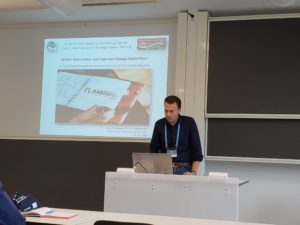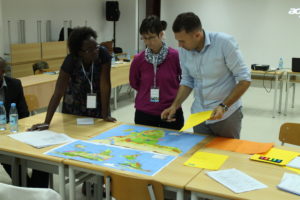Eduardo Oliveira is a Post-Doctoral Research Associate (with the aim of Habilitation) at the Economic Geography Working Group of the Department of Geography at Christian-Albrechts-Universität zu Kiel, Germany. He teaches evolutionary economic geography and the interlinkage between sustainability principles and economic geography paradigms. His prime scientific interests are within the fields of spatial planning instruments such as strategic spatial planning and place branding. His research involves also economic geography concepts and the embedding of these in evolutionary governance systems. His current research focuses on analysing the effectiveness of strategic spatial planning instruments in supporting the social and economic development of less-developed regions and local communities within, whilst assessing its effect on environmental sustainability. He holds a M.Sc. from the University of Minho in Portugal and University Science Malaysia, and a Ph.D. from the University of Groningen, the Netherlands. He held positions at the University Louvain, Belgium and Swiss Federal Research Institute WSL in Switzerland.
At the WSL, he worked in the Swiss National Science Foundation funded CONCUR project. The overall goal of this interdisciplinary project was to operationalize and analyse how strategic spatial plans affect urban-land change in urban regions as Zurich, Lyon, Stockholm, Oslo, Austin, Pittsburgh or Bucharest among others. His role in the project was to investigate the governance arrangements and negotiations representing the overall activity through which strategic spatial plans are formulated and implemented (Oliveira & Hersperger, 2019). A key finding is that governance in European urban regions is being co-opted into neoliberal agendas and the implementation of strategic plans is characterized by funding schemes, power configurations and performance-based approaches (Oliveira & Hersperger, 2018).

At the University Louvain he worked within the European Research Council funded MIDLAND project. The overall goal of this project was to develop theories to explain the relationship between land use intensification, land use displacement (including processes of rural-to-urban mobility and urban development) and land use transitions across scales. The project focuses on the emerging land use frontier of Southern Africa and its links with distant causes and indirect consequences of rural and urban land changes. His role in this project was to develop a process for strategic spatial planning for Mozambique, a country where recent armed conflicts are still fresh and colonial legacies remain. This strategic planning process accounts for the trade-off between local-based social and economic challenges and global interests for land-based investments. In June 2019, he led fieldwork in Maputo, the capital of Mozambique. He interviewed foreign investors in forestry and agribusiness and international donors as Japan Cooperation Agency (JICA), the Swiss Agency for Development and the World Bank. The results of these interviews contribute to a better understanding on how business strategies and governance arrangements effect the livelihoods of local communities.

In 2017, Sally Hardy (CEO) and the board of the Regional Studies Association, presented Eduardo, Julie Tiao Miao and Michael Taster with a challenge; to lead the transformation of Regions from a members only printed magazine to a fully online and open access digital format (Editorial of Issue 1). This editorial team accepted the challenge. Since then, Eduardo is the lead editor of Regions e-zine. At the present and together with Stefania Fiorentino and Robert Bowen they aim to make of Regions e-zine a significant publication and a vital space in which the regional studies community can converse. Eight issues of Regions are now available online, and all can be accessed freely. These issues include some articles examining spatial development issues, including climate change, finances and housing in a context of urban and societal transformation. For example, in Issue 1, Susanne Frick reflects on how urbanization affect economic development (Frick, 2018) and gives her suggestions on new urban policy thinking. In Issue 3, Xiangming Chen et al. present a framework for understanding the risks involved in China’s Belt and Road Initiative (Chen et al., 2018). In Issue 5, Jen Nelles et al. outline how large infrastructure investments throughout the Global South are challenging the ways of thinking about urban growth and infrastructure provision (Nelles et al., 2019). In Issue 6, Naomi Hazarika throws light on the dynamics of urban redevelopment involving the opening up of state lands for private investment where informal settlements are located in the city of Delhi, India (Hazarika, 2020). The latest Issue 8 is themed around Housing Issues in Contemporary Urban Regions. In 2021, the three thematic issues will focused on the geography of sustainability transition in the context of COVID-19 pandemic, the urban-rural nexus in changing times and economic and social challenges faced by coastal communities among other topics. The call for papers will be announced through social media.

Eduardo is also active in rendering service to the research community. He devotes time to convey innovations in science and technology that can improve people’s quality of life with due consideration to social and eco-sustainability through the project Science for Society & Sustainability.
Words of Wisdom
These words of wisdom are primarily oriented to early career researchers and Ph.D. candidates. Becoming a Ph.D. researcher had been my dream since 2000, the year I started my first university degree in Northern Portugal. Since then, all my efforts and enthusiasm had a single purpose—to help me pursue studies at the doctoral level. I knew in advance that becoming a Ph.D. researcher would be a tough task. I was expecting to face multiple challenges, such as finding a host institution, being accepted by a supervisor, managing a scholarship and so on. Only with strong determination and confidence was I able to overcome all the challenges and start my Ph.D., 12 years after my first steps in the higher education system. In 2012, I went onto obtain a 4-year Ph.D. scholarship from The Foundation of Science and Technology in Portugal. This was a major scientific achievement; one that greatly supported to my ensuing academic trajectory and expertise within strategic spatial planning, and economic geography concepts.
It was during my Ph.D. studies that I reached a noteworthy scientific achievement. My single-authored paper, ‘Place Branding in Strategic Spatial Planning’ (Oliveira, 2015), published in the Journal of Place Management and Development in 2016 was awarded the Outstanding Paper Award in the Emerald Publishing Literati Awards for Excellence. The paper examines how spatial plans and urban policies guiding development trajectories for the major urban regions of Northern Portugal deal with place branding i.e. the application of the principles and methods of branding to the promotion of the environmental (landscape amenities as urban forests) and non-environmental spatial qualities (urban features as transportation infrastructures).
What I can share with early career researchers within regional studies community is that there is neither a single answer nor a one-size-fits-all approach to surviving a Ph.D. dissertation, acquiring academic and professional notoriety and positioning oneself in today’s highly competitive job market as post-doctoral researcher, lecturer or other. However, some useful advice can certainly be provided to researchers currently preparing a doctoral dissertation or aiming to do so in the near future. My experience evidences “key ingredients” on how to complete a Ph.D. and succeed on the job market. First, prepare yourself in multiple ways and in advance, from learning about a topic to embrace a critical approach to everything urban and regional challenges. Secondly, be determined about what you want and where you want to go or how you want to enable change in your life or around you. Thirdly, Confidence is without doubt another key ingredient. Without a humble but realistic confidence in your own research skills, you cannot be successful on achieving or accomplishing your short-term tasks neither long-term goals. Fourth, it is also important to recognize that the harder you work and the better prepared you are, the more you will achieve. Working hard does not necessarily mean that you will have to avoid moments of relaxation, for example. Time well managed opens all possibilities to accomplish work and have some fun as well. Fifth, engage with academics, practitioners and worldwide experts on your field of expertise. Establish networks among them and ask them if they can read and comment your working papers. Sixth, do not fear failure, take the chance and expand your horizons, explore research synergies with other institutions and scholars. The doors that you can open today could lead to greater achievements in near future. This reflection is also my modest contribution to the book Reflections on Academic Lives, edited by Staci Zavattaro and Shannon Orr.
Relevant links
RSA Regions e-Zine: Regions e-Zine examines the prime issues affecting our cities and urban regions
Key work within regional studies: Constructing regional advantage in branding the cross-border Euroregion Galicia–northern Portugal
Key work within strategic spatial planning: Urban land-use change: The role of strategic spatial planning